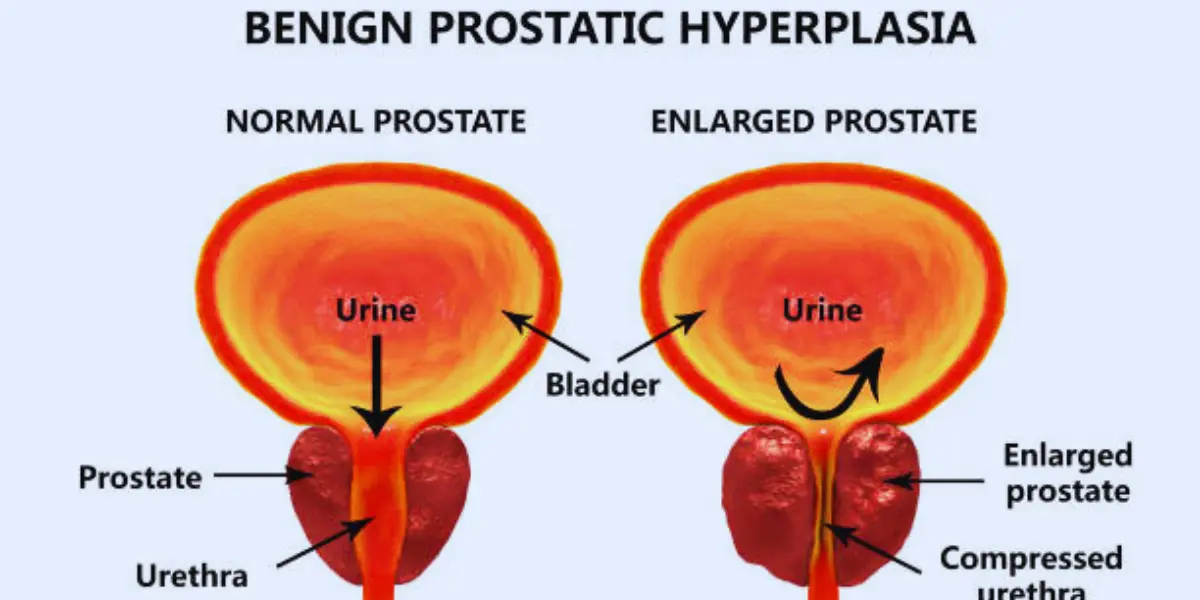Benign prostatic Hyperplasia is a common condition in older men. It concerns the enlargement of the prostate gland. This enlargement can result in uncomfortable urinary symptoms that include frequent urination, difficulty in starting urination, and a feeling of incomplete emptying after urination. Although age and genetics can significantly cause BPH, some lifestyle choices help either reduce the risk of BPH or ease its symptoms. This article will provide tactical and easy-to-understand ways to prevent BPH.
Benign Prostatic Hyperplasia| Symptoms & Treatment
BPH is different from prostate cancer. It is a natural part of the aging process that affects about half the men in their 5os. The symptoms that arise from an enlarged prostate and the urethra can be challenging. They can even disrupt a man’s everyday activities. These symptoms include frequent urge to urinate, difficulty in starting urination, weak or interrupted urine flow, and feeling of incomplete emptying of the bladder after urination. It is essential to understand the causes and symptoms so that appropriate prevention measures can be taken.

Preventive Strategies
Maintain Healthy Diet
- Eat fruits and vegetables: A diet rich in antioxidants like fruits and vegetables can reduce prostate inflammation. Antioxidants also work against free radicals, which cause BPH.
- Reduce Red Meat and high-fat dairy: Consuming lean proteins and low-fat dairy products may be a good option. Studies suggest that red meat and fatty dairy products cause BPH. Opting for white meats like poultry or fish and adding more plant-based proteins to your diet is advisable.
Regular Physical Activity
Exercise Regularly.. Participating in regular physical activity is also important. Target at least 3o minutes of moderate exercise daily. Exercise helps in keeping good weight and hormonal balance., both of which reduce the risk of developing BPH.
Watch Your Weight
- Maintain a healthy Weight: Being overweight can worsen the symptoms of BPH. Extra weight can put more pressure on the bladder and surrounding areas, increasing urinary symptoms. It’s important to regularly monitor your weight and seek medical advice if you notice significant changes. Acquiring a healthy weight through diet and exercise can prevent BPH or manage its symptoms.
Limit Fluid Intake At Night
- Reduce Liquid Consumption in the Evening: To reduce the frequency of nighttime urination, limiting fluid intake in the hours leading up to bedtime is advisable. Avoiding beverages two hours before sleeping can lessen nighttime urination.
Avoid Or Limit Certain Medications Or Supplements
Consult Your Doctor
One should consult the healthcare provider before taking new medications or supplements. Some over-the-counter medicines can worsen the BPH symptoms. For instance, some decongestants may increase the risk of urinary retention.
Manage Chronic Conditions
- Control Diabetes and Heart Disease: Properly managing chronic conditions like diabetes and heart disease is important. Poor control of these conditions can lead to hormonal imbalances and increased inflammation, which may cause BPH symptoms.
- Reduce Stress: Stress can harm the body in many ways, including increasing the symptoms of BPH. Relaxing activities like Yoga, meditation, and deep breathing can help manage stress levels.
Healthy Bladder Habits
Urinate When You Feel The Need: Avoid holding urine for prolonged periods as it can increase bladder pressure and worsen the symptoms.
Double voiding Technique: After urinating, wait a few moments and try again to ensure the bladder is empty.
Regular Medical Check-ups
Stay on Top of Prostate Health. Regular check-ups with your healthcare provider, including prostate screenings, are crucial. These check-ups can help in the early detection and management of BPH.
Quit Smoking
Smoking has been linked to the worsening of BPH symptoms. Quitting smoking can improve overall health and ease BPH symptoms.
Limit Alcohol Consumption
Alcohol consumption can increase urine production and irritate the bladder. It’s imperative to limit alcohol intake in the evening to reduce nighttime urination.

Outcome
Preventing or effectively managing BPH is achievable. Through lifestyle changes and proactive health management, you can make it possible. While one can’t change aging or family history, making healthy choices can help you with BPH. If you workout regularly, eat a healthy diet, manage your weight, and find ways to relax, you can lower your chances of encountering BPH. It’s also important to see your doctor regularly. This can help you stay healthier and more comfortable as you get older.